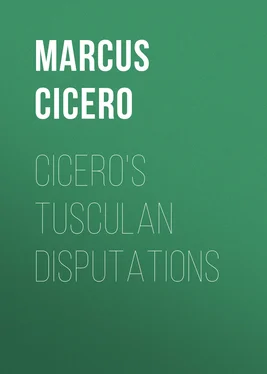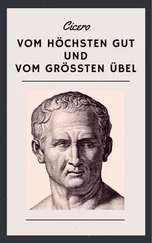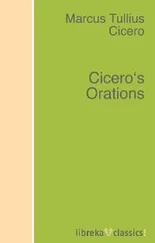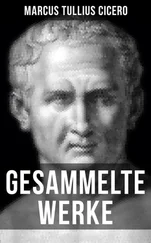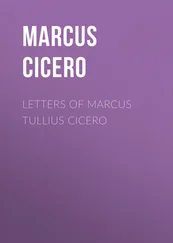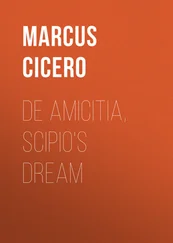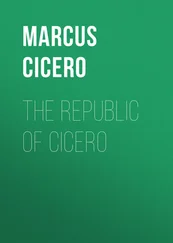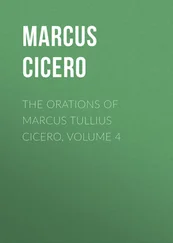Marcus Cicero - Cicero's Tusculan Disputations
Здесь есть возможность читать онлайн «Marcus Cicero - Cicero's Tusculan Disputations» — ознакомительный отрывок электронной книги совершенно бесплатно, а после прочтения отрывка купить полную версию. В некоторых случаях можно слушать аудио, скачать через торрент в формате fb2 и присутствует краткое содержание. Издательство: Иностранный паблик, Жанр: foreign_antique, Философия, foreign_edu, на английском языке. Описание произведения, (предисловие) а так же отзывы посетителей доступны на портале библиотеки ЛибКат.
- Название:Cicero's Tusculan Disputations
- Автор:
- Издательство:Иностранный паблик
- Жанр:
- Год:неизвестен
- ISBN:нет данных
- Рейтинг книги:3 / 5. Голосов: 1
-
Избранное:Добавить в избранное
- Отзывы:
-
Ваша оценка:
- 60
- 1
- 2
- 3
- 4
- 5
Cicero's Tusculan Disputations: краткое содержание, описание и аннотация
Предлагаем к чтению аннотацию, описание, краткое содержание или предисловие (зависит от того, что написал сам автор книги «Cicero's Tusculan Disputations»). Если вы не нашли необходимую информацию о книге — напишите в комментариях, мы постараемся отыскать её.
Cicero's Tusculan Disputations — читать онлайн ознакомительный отрывок
Ниже представлен текст книги, разбитый по страницам. Система сохранения места последней прочитанной страницы, позволяет с удобством читать онлайн бесплатно книгу «Cicero's Tusculan Disputations», без необходимости каждый раз заново искать на чём Вы остановились. Поставьте закладку, и сможете в любой момент перейти на страницу, на которой закончили чтение.
Интервал:
Закладка:
XXXI. Here some people talk of moderate grief; but if such be natural, what occasion is there for consolation? for nature herself will determine, the measure of it: but if it depends on and is caused by opinion, the whole opinion should be destroyed. I think that it has been sufficiently said, that grief arises from an opinion of some present evil, which includes this belief, that it is incumbent on us to grieve. To this definition Zeno has added, very justly, that the opinion of this present evil should be recent. Now this word recent they explain thus: those are not the only recent things which happened a little while ago; but as 124long as there shall be any force, or vigor, or freshness in that imagined evil, so long it is entitled to the name of recent. Take the case of Artemisia, the wife of Mausolus, King of Caria, who made that noble sepulchre at Halicarnassus; while she lived, she lived in grief, and died of it, being worn out by it, for that opinion was always recent with her: but you cannot call that recent which has already begun to decay through time. Now the duty of a comforter is, to remove grief entirely, to quiet it, or draw it off as much as you can, or else to keep it under, and prevent its spreading any further, and to divert one’s attention to other matters. There are some who think, with Cleanthes, that the only duty of a comforter is to prove that what one is lamenting is by no means an evil. Others, as the Peripatetics, prefer urging that the evil is not great. Others, with Epicurus, seek to divert your attention from the evil to good: some think it sufficient to show that nothing has happened but what you had reason to expect; and this is the practice of the Cyrenaics. But Chrysippus thinks that the main thing in comforting is, to remove the opinion from the person who is grieving, that to grieve is his bounden duty. There are others who bring together all these various kinds of consolations, for people are differently affected; as I have done myself in my book on Consolation; for as my own mind was much disordered, I have attempted in that book to discover every method of cure. But the proper season is as much to be attended to in the cure of the mind as of the body; as Prometheus in Æschylus, on its being said to him,
Конец ознакомительного фрагмента.
Текст предоставлен ООО «ЛитРес».
Прочитайте эту книгу целиком, купив полную легальную версию на ЛитРес.
Безопасно оплатить книгу можно банковской картой Visa, MasterCard, Maestro, со счета мобильного телефона, с платежного терминала, в салоне МТС или Связной, через PayPal, WebMoney, Яндекс.Деньги, QIWI Кошелек, бонусными картами или другим удобным Вам способом.
1
Archilochus was a native of Paros, and flourished about 714-676 b.c. His poems were chiefly Iambics of bitter satire. Horace speaks of him as the inventor of Iambics, and calls himself his pupil.
Parios ego primus Iambos
Ostendi Latio, numeros animosque secutus
Archilochi, non res et agentia verba Lycamben.
And in another place he says,
Archilochum proprio rabies armavit Iambo—A.P. 74.
2
This was Livius Andronicus: he is supposed to have been a native of Tarentum, and he was made prisoner by the Romans, during their wars in Southern Italy; owing to which he became the slave of M. Livius Salinator. He wrote both comedies and tragedies, of which Cicero (Brutus 18) speaks very contemptuously, as “Livianæ fabulæ non satis dignæ quæ iterum legantur”—not worth reading a second time. He also wrote a Latin Odyssey, and some hymns, and died probably about 221 b.c.
3
C. Fabius, surnamed Pictor, painted the temple of Salus, which the dictator C. Junius Brutus Bubulus dedicated 302 b.c. The temple was destroyed by fire in the reign of Claudius. The painting is highly praised by Dionysius, xvi. 6.
4
For an account of the ancient Greek philosophers, see the sketch at the end of the Disputations.
5
Isocrates was born at Athens 436 b.c. He was a pupil of Gorgias, Prodicus, and Socrates. He opened a school of rhetoric, at Athens, with great success. He died by his own hand at the age of ninety-eight.
6
So Horace joins these two classes as inventors of all kinds of improbable fictions:
Pictoribus atque poetis
Quidlibet audendi semper fuit æqua potestas.—A. P. 9.
Which Roscommon translates:
Painters and poets have been still allow’d
Their pencil and their fancies unconfined.
7
Epicharmus was a native of Cos, but lived at Megara, in Sicily, and when Megara was destroyed, removed to Syracuse, and lived at the court of Hiero, where he became the first writer of comedies, so that Horace ascribes the invention of comedy to him, and so does Theocritus. He lived to a great age.
8
Pherecydes was a native of Scyros, one of the Cyclades; and is said to have obtained his knowledge from the secret books of the Phœnicians. He is said also to have been a pupil of Pittacus, the rival of Thales, and the master of Pythagoras. His doctrine was that there were three principles (Ζεὺς, or Æther; Χθὼν, or Chaos; and Χρόνος, or Time) and four elements (Fire, Earth, Air, and Water), from which everything that exists was formed.— Vide Smith’s Dict. Gr. and Rom. Biog.
9
Archytas was a native of Tarentum, and is said to have saved the life of Plato by his influence with the tyrant Dionysius. He was especially great as a mathematician and geometrician, so that Horace calls him
Maris et terra numeroque carentis arenæ
Mensorem.
Plato is supposed to have learned some of his views from him, and Aristotle to have borrowed from him every idea of the Categories.
10
This was not Timæus the historian, but a native of Locri, who is said also in the De Finibus (c. 29) to have been a teacher of Plato. There is a treatise extant bearing his name, which is, however, probably spurious, and only an abridgment of Plato’s dialogue Timæus.
11
Dicæarchus was a native of Messana, in Sicily, though he lived chiefly in Greece. He was one of the later disciples of Aristotle. He was a great geographer, politician, historian, and philosopher, and died about 285 b.c.
12
Aristoxenus was a native of Tarentum, and also a pupil of Aristotle. We know nothing of his opinions except that he held the soul to be a harmony of the body; a doctrine which had been already discussed by Plato in the Phædo, and combated by Aristotle. He was a great musician, and the chief portions of his works which have come down to us are fragments of some musical treatises.—Smith’s Dict. Gr. and Rom. Biog.; to which source I must acknowledge my obligation for nearly the whole of these biographical notes.
13
The Simonides here meant is the celebrated poet of Ceos, the perfecter of elegiac poetry among the Greeks. He flourished about the time of the Persian war. Besides his poetry, he is said to have been the inventor of some method of aiding the memory. He died at the court of Hiero, 467 b.c.
Читать дальшеИнтервал:
Закладка:
Похожие книги на «Cicero's Tusculan Disputations»
Представляем Вашему вниманию похожие книги на «Cicero's Tusculan Disputations» списком для выбора. Мы отобрали схожую по названию и смыслу литературу в надежде предоставить читателям больше вариантов отыскать новые, интересные, ещё непрочитанные произведения.
Обсуждение, отзывы о книге «Cicero's Tusculan Disputations» и просто собственные мнения читателей. Оставьте ваши комментарии, напишите, что Вы думаете о произведении, его смысле или главных героях. Укажите что конкретно понравилось, а что нет, и почему Вы так считаете.
